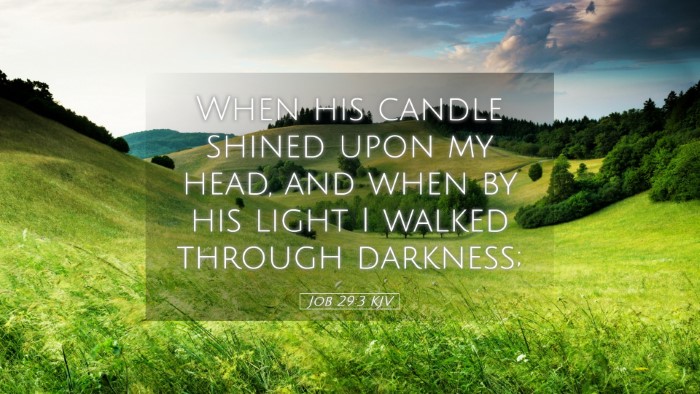Old Testament
Genesis Exodus Leviticus Numbers Deuteronomy Joshua Judges Ruth 1 Samuel 2 Samuel 1 Kings 2 Kings 1 Chronicles 2 Chronicles Ezra Nehemiah Esther Job Psalms Proverbs Ecclesiastes Song of Solomon Isaiah Jeremiah Lamentations Ezekiel Daniel Hosea Joel Amos Obadiah Jonah Micah Nahum Habakkuk Zephaniah Haggai Zechariah MalachiJob 29:3
Job 29:3 KJV
When his candle shined upon my head, and when by his light I walked through darkness;
Job 29:3 Bible Commentary
Commentary on Job 29:3
Job 29:3 (KJV): "When his candle shined upon my head, and when by his light I walked through darkness."
Context and Overview
The Book of Job is a profound exploration of human suffering, divine justice, and the nature of God. In this particular verse, Job reflects on his past experiences of divine favor and guidance during times of adversity. It is crucial to analyze not only the linguistic elements of this verse but also its theological implications.
Historical and Literary Context
Job's monologue in this chapter serves as a poignant reminder of his former state of blessedness, juxtaposed against the present suffering he endures. This verse stands as a metaphor for divine guidance and illumination in times of turmoil.
Job’s Recognition of Divine Favor
Matthew Henry emphasizes that the "candle" signifies both divine revelation and personal insight. Job acknowledges that it was God who illuminated his path during times of darkness, underscoring the intimate relationship between the believer and the divine.
Thematic Insights
Several themes arise from this verse, each requiring further exploration:
-
Divine Guidance:
Albert Barnes notes that the imagery of light symbolizes God's guidance. In the Hebraic context, light is often synonymous with knowledge, purity, and truth. Job recalls a time when he was fully guided by God, highlighting the stark contrast to his current afflictions.
-
Memory and Reflection:
Adam Clarke remarks on the nature of memory in this verse. Job uses reflective discourse to convey his understanding of God's past mercies as a source of strength amid hardship. The act of remembering God's blessings can serve to uplift and sustain believers during trials.
-
Walking Through Darkness:
This phrase evokes a powerful image of perseverance through trials. The word "darkness" can signify despair, doubt, and confusion—states that many believers encounter. Job's assertion underscores the necessity of divine light to navigate and overcome life's deepest challenges.
Exegesis of Key Phrases
Understanding key phrases enhances the depth of this verse:
-
"Candle shined upon my head":
This imagery communicates the idea of being enlightened, suggesting that God's favor was personally bestowed upon Job. Henry elaborates that the "candle" represents an experiential knowledge of God’s presence and blessing.
-
"By his light I walked":
This indicates a reliance on God for guidance in every aspect of life. The connection between walking and light signifies the disciplined and intentional nature of living in accordance with God’s will. So, both direction and purpose stem from divine illumination.
Theological Implications
This verse brings forth several theological implications regarding the nature of God and His providence:
-
God as Light:
The metaphor of God as light recurs throughout Scripture, representing purity, wisdom, and holiness. Job's experience affirms the belief that God is intimately involved in guiding His people, allowing them to navigate life's vicissitudes with assurance.
-
The Nature of Suffering:
Job's journey illustrates that suffering is an intrinsic part of the human experience, yet believers can cling to the hope and guidance provided by God through difficult times. This duality is key for pastoral care and counseling.
-
Reflection and Spiritual Growth:
Clarke's observation reminds us that moments of reflection on past experiences of divine faithfulness can strengthen one's faith. For theologians and students of God’s Word, Job's declaration invites contemplation on how personal experiences influence spiritual maturity.
Application for Today’s Believers
This verse holds profound applicability for modern believers:
-
Trust in Divine Guidance:
In times of uncertainty, believers can find reassurance in Job's testimony. As they navigate their own darkness, they can seek God's light for direction and comfort.
-
The Power of Remembrance:
Remembering God's past provisions and interventions can fortify one's faith. This practice of reflection can become an essential element of spiritual discipline for individuals and within church communities.
-
Community Support:
Job’s expression of reflective sorrow can resonate within church settings, where community and understanding provide avenues for healing and hope. Pastors are encouraged to draw from this narrative when offering counsel to those who are struggling.
Conclusion
Job 29:3 stands as a poignant reminder of the necessary reliance upon God’s light during life’s darkest moments. Through the lenses of historical insight, thematic exploration, and theological reflection, both scholars and laypersons can extract meaningful applications that strengthen their journey of faith and service to others.


